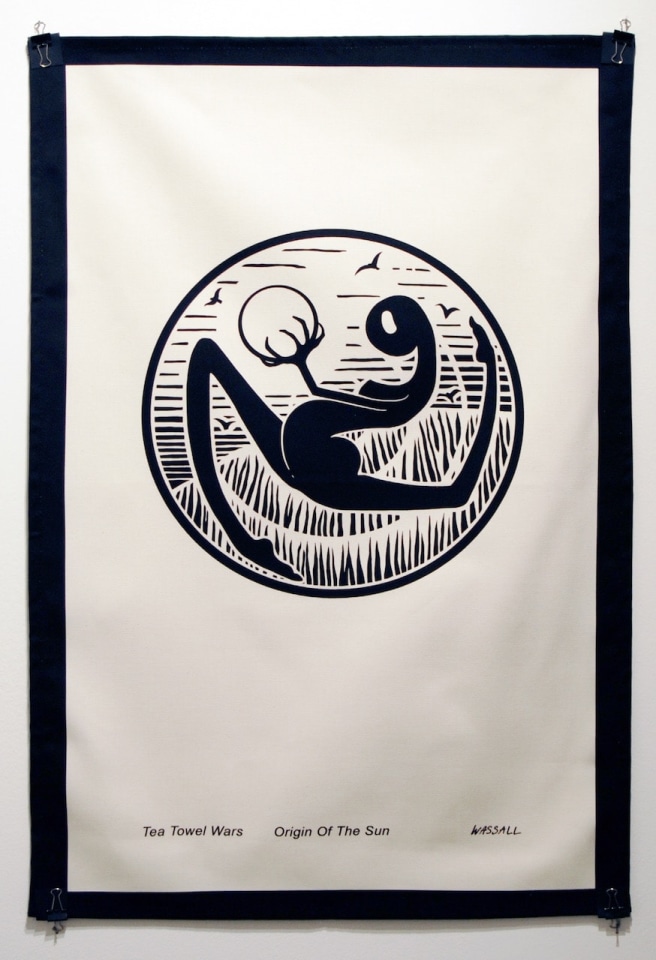Nicole Wassall
Tea Towel Wars - Origin of the Sun, 2023
100% natural Panama cotton 309gsm, with 4 hand hemmed sides and a black hanging loop.
Printed using reactive inks so they wash well, keep their colour longer and are kinder on the environment.
Printed using reactive inks so they wash well, keep their colour longer and are kinder on the environment.
71 x 46 cm
28 x 18 1/8 in
28 x 18 1/8 in
Copyright The Artist
Further images
100% natural Panama cotton 309gsm, with 4 hand hemmed sides and a black hanging loop decorated with the Dreamtime tale of Wuriupranili. Decorated tea towels became status symbols in Victorian...
100% natural Panama cotton 309gsm, with 4 hand hemmed sides and a black hanging loop decorated with the Dreamtime tale of Wuriupranili.
Decorated tea towels became status symbols in Victorian England, as textiles became more available, and genteel women hand embroidered them to show off their creativity and good taste. Whilst this tradition has largely died out, the humble tea towel has remained popular for both its design and versatility.
Now the responsibility for ‘washing up’ has become a symbolic battle ground for domesticated equality. The title of this piece, Tea Towel Wars, both trivialises domestic disharmony caused by sexism and seemingly contradicts itself by putting a focus on the ridiculousness of the same lack of domestic equality.
The two tea towels borrow from Australian Aboriginal Dreamtime stories. Unlike many European narratives, that put the man as the strong sun and the moon as the weak and sickly woman (as expressed in the early feminist poem ‘In Dispraise of the Moon’ by Mary Elizabeth Coleridge published in 1893), the Aboriginal tradition puts the woman as the tireless sun and the moon as the lazy man. A poignant destination given the Australian Aboriginal culture is the oldest civilisation on earth, dating back some 75000 years, and the sun is placed in the centre of the Australian Aboriginal flag.
Tea Towel Wars - Origin of the Sun
Wuriupranili wakes when it’s still dark, builds a campfire and beautifies herself with ochre powder. Often this powder spills and colours the morning sky. She makes a torch of stringy bark, it is the sun, and she carries it across the sky from east to west. As she reaches the west, she goes behind the horizon reducing her torch to a glow. She decorates herself in ochre powder once more and the spilt powder colours the sky. Night falls as she enters the underground tunnel leading back to morning camp, her torch lights her way and warms the earth, so that plants grow. Once back at camp she rests before the cycle begins again the following morning.
These stories are from the Yolngu people of Northern Australia. Nicole Wassall, the artist, acknowledges the First Nations peoples as the original storytellers. She pays her respect to the Aboriginal cultures; and to Elders past and present.
Decorated tea towels became status symbols in Victorian England, as textiles became more available, and genteel women hand embroidered them to show off their creativity and good taste. Whilst this tradition has largely died out, the humble tea towel has remained popular for both its design and versatility.
Now the responsibility for ‘washing up’ has become a symbolic battle ground for domesticated equality. The title of this piece, Tea Towel Wars, both trivialises domestic disharmony caused by sexism and seemingly contradicts itself by putting a focus on the ridiculousness of the same lack of domestic equality.
The two tea towels borrow from Australian Aboriginal Dreamtime stories. Unlike many European narratives, that put the man as the strong sun and the moon as the weak and sickly woman (as expressed in the early feminist poem ‘In Dispraise of the Moon’ by Mary Elizabeth Coleridge published in 1893), the Aboriginal tradition puts the woman as the tireless sun and the moon as the lazy man. A poignant destination given the Australian Aboriginal culture is the oldest civilisation on earth, dating back some 75000 years, and the sun is placed in the centre of the Australian Aboriginal flag.
Tea Towel Wars - Origin of the Sun
Wuriupranili wakes when it’s still dark, builds a campfire and beautifies herself with ochre powder. Often this powder spills and colours the morning sky. She makes a torch of stringy bark, it is the sun, and she carries it across the sky from east to west. As she reaches the west, she goes behind the horizon reducing her torch to a glow. She decorates herself in ochre powder once more and the spilt powder colours the sky. Night falls as she enters the underground tunnel leading back to morning camp, her torch lights her way and warms the earth, so that plants grow. Once back at camp she rests before the cycle begins again the following morning.
These stories are from the Yolngu people of Northern Australia. Nicole Wassall, the artist, acknowledges the First Nations peoples as the original storytellers. She pays her respect to the Aboriginal cultures; and to Elders past and present.





